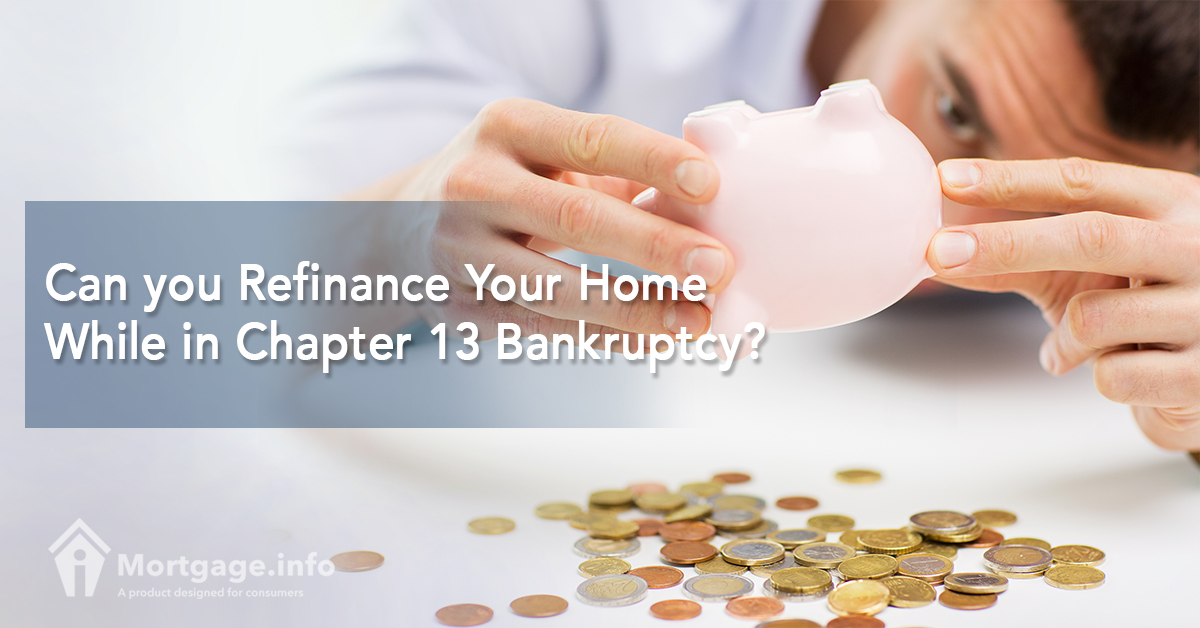Filing for Chapter 13 Bankruptcy does not mean that you are ineligible for new credit. This form of bankruptcy allows you to keep personal property and even the debts you have. The program simply restructures the debts so that you can pay them off within the next 3 to 5 years. There are a few loan programs you can apply for a few years after filing for Chapter 13 bankruptcy, but FHA loans only require that you wait 12 months before applying.
Are your payments on time?
You probably already know that your mortgage payment history plays a vital role in your ability to secure approval for a refinance. For example, if you have 2 payments that are more than 30-days late in the last 12 months, chances are you will not be able to find a mortgage program that you qualify to obtain. The same is true for your Chapter 13 payments. Lenders consider them just as important as your mortgage payments. They will ask for a history of your bankruptcy payments; if there are any payments later than 30 days, you might not be eligible to refinance just yet.
Why are you refinancing?
Your lender and your BK trustee will want to know why you want to refinance. Do you want to lower your payment by securing a lower interest rate? Maybe you want to include your debts into your mortgage to reduce the amount of interest you pay. Whatever the case may be, you need to be upfront with your trustee as well as your mortgage lender to ensure that the process goes smoothly.
Do you qualify for FHA financing?
The next step is to determine if you qualify for FHA financing. The guidelines for this program are rather simple, leaving it as an option for many people that filed for bankruptcy. The basic requirements for the FHA loan include:
- Is your credit score higher than 580? This is the general score that most lenders stick to even though the FHA allows scores as low as 500.
- Are your payments on time for the last 12 months for all debts including mortgage, credit cards and BK payments?
- Are your debt ratios around 31/43? The FHA is flexible with debt ratios, but these are the general guidelines.
- Do you have at least 3.5% equity in the home?
- Do you have the money to pay the closing costs?
These are the general FHA guidelines. If you know that your debt ratios are very high or that your credit score is below 580, you can also try subprime lenders for financing. Subprime does not mean excessively high interest rates or crazy closing costs, so they are worth exploring if you need/want to refinance after a Chapter 13 Bankruptcy.
Gaining Court Approval
The procedure to gain court and/or trustee approval varies by where you live. The rules in Colorado, for example, are much different than the rules in California. Your bankruptcy attorney can help you determine what guidelines you must meet in order to qualify for a refinance while still in the bankruptcy. Typically, you need to provide the trustee with the necessary paperwork from your intended lender that shows the rate, term and cost of the new loan to help the trustee to determine if the new debt fits within your budget.
Closing on the Loan
Once you have approval from your trustee to obtain a loan after a Chapter 13 bankruptcy, the rest of the process works much the same as any other loan. The underwriter finishes up ensuring that you qualify for the loan and then sets you up for a closing. At the closing, you sign the loan documents and the title agent pays off your current mortgage. You now have a new mortgage with a new payment to help you turn over a brand new leaf after filing for bankruptcy.
You should know that there are many stipulations you may have to meet in order to qualify for the refinance after a Chapter 13 Bankruptcy. Not every lender will approve you for the loan and not every trustee allows new financing. In order to better your chances, try to make your bankruptcy installment payments on time every month to give the trustee the faith in you that he needs to allow new financing. It also helps if the new financing has a benefit, such as saving you money every month or saving you several thousands of dollars in interest in the long run.
The more evidence you have for the trustee and the underwriter that a refinance will help you out, the more likely it is that you will secure an approval. If one lender turns you down, but you have approval from your trustee, keep shopping. Do not forget about the option to use subprime or alternative lenders as well. They often have more lucrative programs than the FHA has, giving you the opportunity to refinance your mortgage and start saving money as soon as 12 months after filing for bankruptcy.

